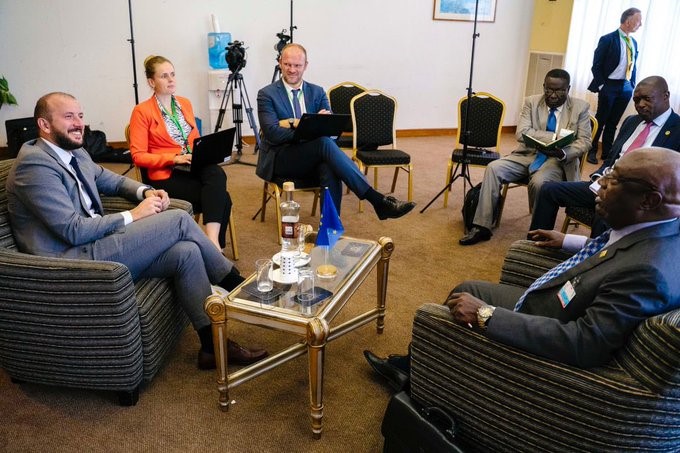Bilateral meetings of Commissioner Sinkevičius at the 18th African Ministerial Conference on the Environment | 12-16 September 2022

date: 14/10/2022
TheAfrican Union Commissioner, Josefa Leonel Correia Sacko, presented the latest policy developments of the African Union Commission, including the development of the African Union Green Recovery Action Plan (AU GRAP), and the Climate Change and Resilient Development Strategy. She stressed the worrying situation of the droughts in the Horn of Africa requiring particular support, notably on Water management and other reforestation projects, such as the Great Green Wall supported by the EU.
Commissioner Sinkevičius welcomed the AU GRAP and mentioned its priorities were aligned with those of the EU Global Gateway investment package adopted in the last EU-AU Summit. He stressed EU’s interest to deepen cooperation with the African Union Commission (AUC) and to have more regular exchanges between the AUC and the European Commission teams on green strategies, in order to discuss concrete projects and opportunities. On the CBD COP15, Commissioner Sinkevičius mentioned the importance to have a high-level segment in the conference to create political momentum and the need to build trust in the negotiations. On resource mobilisation, he mentioned the need to use existing financial mechanisms like the Global Environment Facility (GEF). He also mentioned the need to increase interlinkages between climate and biodiversity conventions, while recognising the need to avoid double counting and bring in fresh biodiversity money to build trust. Finally, on the 30x30 biodiversity target, he insisted on the global nature of the target and invited to fight unfounded fear from some African countries, showing that the target will be adapted to local circumstances.
With the Executive Director of CBD Secretariat, Elizabeth Mrema, the Commissioner discussed the progress on COP15 preparations and emphasised the need to have a High-Level Segment with Heads of States at the beginning of the conference, to help to raise additional financial resources.
The Minister of Energy Transition and Sustainable Development of Morocco, Leila Benali, mentioned the necessity to better manage the expectations of those asking for billions to be mobilised, to improve credibility towards COP27 and COP15 negotiations. To this, Commissioner Sinkevičius suggested to avoid overlapping of biodiversity resources with Climate finance that could be seen as double counting of pledges. Moreover, they both discussed the need to involve the private sector, and to identify a relevant pipeline of bankable projects benefitting biodiversity notably through de-risking investments (through blending, guarantees and others financial instruments).
On her side, Eve Bazaiba Masudi, Vice Prime Minister and Minister of the Environment of the Democratic Republic of the Congo (DRC), confirmed her presence in Montreal and the importance CBD COP 15, and underlined the huge responsibility of the DRC, being the fifth country with the greatest biodiversity in the world. Throughout the meeting, she stressed that DRC’s main challenge to protect its biodiversity is security. DRC is facing three types of insecurity: 1) insecurity linked with the presence of armed groups that threatens both humans and biodiversity; 2) insecurity linked with widespread poverty; 3) insecurity linked with the indifference of the international community to DRC’s challenges. Commissioner Sinkevičius informed about EU legislative work to prevent that products put on the EU market contribute to deforestation, clarified the global nature of the 30x30 biodiversity target, and the role of the Global Environment Facility (GEF) that could lead to concrete projects and results.
With Gabon Minister of Water, Forests, the Sea and the Environment, Lee J.T. White, the Commissioner exchanged on CBD COP15 preparations and on what is needed to reach an agreement on an ambitious Global Biodiversity Framework in Montreal in December. Minister White confirmed that Gabon’s commitment to climate and biodiversity goes from the Head of State down.
On resource mobilisation, from his point of view, the needs are huge and there should be some ambition on finance. However, it is important to be realistic and consider other tracks to follow, such as a proportion of climate finance that should be dedicated to nature-based solutions, the mainstreaming of biodiversity in national development plans, the involvement of the private sector or the fight against harmful subsidies.
On ABS/DSI, Minister White mentioned the general feeling in Africa that their chemicals and genetic resources were being “stolen”, as were their raw materials, and the need to better share the benefits of their use. To this, Commissioner Sinkevicius mentioned that an agreement on DSI was among those that could be reached in Montreal and could bring trust in the room.
Commissioner Sinkevičius and Minister for Environment, Science, Technology and Innovation of Ghana, Kwaku Afriyie, exchanged on Circular Economy. Mr Afriyie highlighted that the notion of circularity was deeply embedded in African tradition. He stressed that finance and technology transfer are the major elements needed from Africa to tackle the climate and biodiversity crisis. The Commissioner recognised Ghana’s leadership in the field of circular economy on the continent and proposed to organise a mission in Ghana to increase knowledge exchanges and business opportunities on circular economy, recycling and waste management. The minister confirmed the great interest of Ghana.
